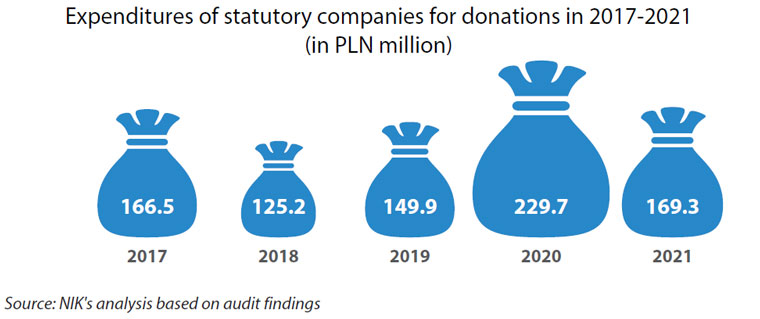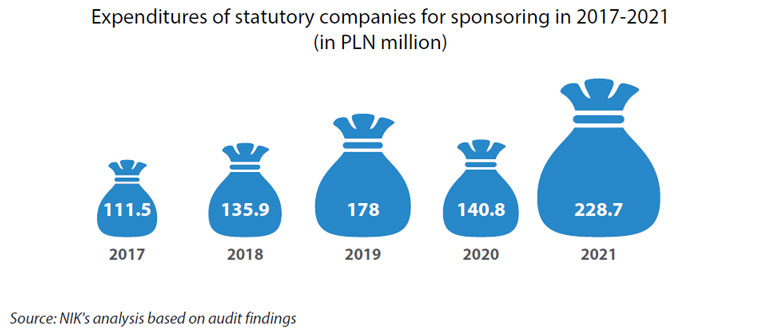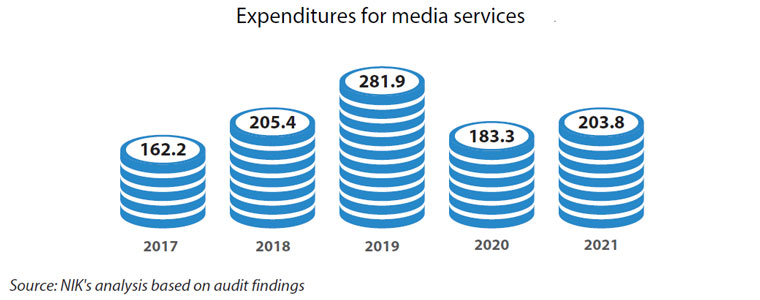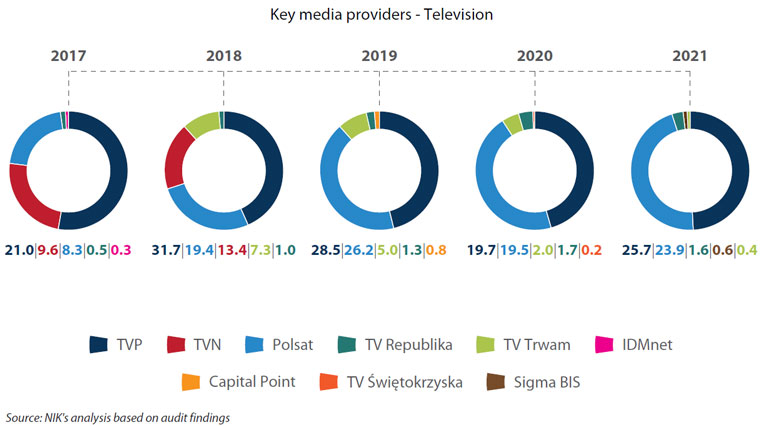The reports filed by NIK are related to: PKN ORLEN and its subsidiaries - PGNiG SA, ENERGA SA and Sigma Bis SA as well as daughter companies of PZU: Alior Bank SA and Link4. Part of those companies had already been audited by NIK several times, e.g. ORLEN and ENERGA in 2017, when the Supreme Audit Office of Poland also verified expenditures for sponsoring and media services. The CEO of both of these companies was the then President of PKN ORLEN Daniel Obajtek.
On the other hand, the foundations which foiled the latest audit were: ORLEN Foundation, ENERGA Foundation, J.K. Steczkowski BGK Foundation and I. Łukasiewicz PGNiG Foundation.
Expenditures for promotion and advisory services are now obvious items in business activity costs. However, 9 statutory companies audited by NIK spent large amounts on donations in 2017-2021, nearly PLN 841 million in total. The companies transferred as much as 81% of that amount to their foundations, of which PLN 152.5 million was paid to the Polish National Foundation. At the same time, the companies earmarked about PLN 795 million for sponsoring. Related expenditures increased in 2021 more than twice against 2017, although it was not justified by their improved economic performance.
The sponsoring was covered by special internal regulations, particularly the spending purpose was monitored. The money paid to the foundations as donations was beyond any supervision, though. The companies did not verify if their foundations used the money received and if so, how. Bizarre developments followed – the companies transferred subsequent donations, although nearly all of the funds donated until then were deposited in the accounts of bank foundations. Interestingly enough, the foundations defined their statutory activity broadly enough to transfer the donations received for any purpose.
NIK notified the Central Anticorruption Bureau about its findings concerning donations paid to five municipalities by KGHM Polska Miedź. Under agreements signed with that concern, five municipalities made changes to the general land use studies and local area development plans effective in their areas. They received nearly PLN 131 million for the agreements execution. According to NIK accepting donations in relation to changes in planning documents was corruption-tainted and could lead to a conflict of interests.
The NIK audit also revealed that in all the statutory companies covered by the audit, the media, legal and advisory services were often purchased without complying with effective purchase procedures and one of industrial sector companies – KGHM – gave up regulations banning the sponsoring of political activity.
After six companies and four foundations prevented NIK from conducting the audit, NIK had a closer look at the activity of 9 in 15 selected statutory companies, 8 in 12 foundations and five municipality offices. The audited period was 2017-2021.
Donations – mainly for the companies’ own foundations
In principle, the sponsoring and purchases of media services are for commercial purposes – to obtain a specific economic/ marketing effect, e.g. sales growth by promoting the sponsor’s brand and its products. Charity is about something else: giving donations or taking on the patronage. In this case it concerns the Corporate Social Responsibility (CSR) which is related to companies investing in human resources, especially in their own employees, as well as in environmental protection or relations with the business environment, and communicating the measures taken.
Out of nearly PLN 841 million, which nine statutory companies provided in 2017-2021 as donations, nearly 30% were expenditures concerning one year only: 2020 (the year of presidential elections).

Most donations were paid to the foundations set up by the audited companies – approx. PLN 681 million in total. NIK did not identify any significant irregularities related to giving donations in 8 of 9 audited companies (apart from KGHM). NIK has noted, though, that the companies analysed neither their foundations’ real needs, nor their activity reports. Besides, the companies did not verify if the money given to the foundations produced effects related to promotion and reputation, significant from the viewpoint of public interest. The NIK audit shows that the companies’ supervision of the foundations began and ended in delegating representatives of the foundations councils who had impact on appointing their management boards.
On the other hand, the lack of link between the foundations’ activity reports and their vague nature did not make it possible to analyse projects run by the foundations. However, none of the audited companies required additional documents, nor did they conduct any audits in their foundations.
The lack of supervision over the foundations resulted among others in their significant financial surpluses, which were not earmarked for current projects or multi-annual programmes. For instance, the PZU Foundation at the end of each year from 2017 to 2020 had free funds at its disposal: about PLN 26 million, about PLN 14 million, about PLN 10 million and PLN 9 million, respectively. The State of Poland Foundation established by BGK at the end of 2020 in its financial statement declared short-term investments totalling nearly PLN 39 million, at the end of 2021 the foundation’s free funds exceeded PLN 26 million. The Most the Most Foundation, also created by BGK, free funds at the end of 2021 amounted to PLN 7.5 million. The NIK auditors’ findings show that the financial surpluses resulted largely from the fact that the foundations failed to execute their planned activities and – although they had money at their disposal – they applied for subsequent donations and received them.
As a result of providing funds regardless of the needs, one of the foundations set up by an industrial sector company incurred costs in 2020-2021 of over PLN 52 thousand because of a high balance on the bank account. The management board requested the funder to start paying funds in tranches from 2022.
NIK did not find any irregularities in spending purposes not included in the statutes. Though, the foundations defined their activity in those documents so broadly that in practice they could provide financial support to any entities. The irregularities identified by NIK were related to the support given against the foundations’ regulations, also to unauthorised entities.
Only one of nine audited foundations measured efficiency of projects and performance level of planned activities. Other foundations did not even plan effects to be achieved. Two foundations undertook projects not approved by their councils – in one of them the planned cost estimate was exceeded by over 216%, whereas in another project expenditures of less than 3% of planned costs were carried out. None of the audited foundations, though, adopted any regulations on purchase procedures, which enabled them to spend money without adhering to competitiveness and transparency principles.
NIK also points to significant differences in the foundations’ own activity costs. For instance, in line with the financial statements in 2021 in the Empiria i Wiedza Foundation set up by Bank Gospodarstwa Krajowego Foundation, overheads made up nearly 77% of statutory activity costs. In case of the Most Foundation, that ratio exceeded 76%, whereas in the BGK Foundation it was a bit over 5%. In view of high statutory activity costs, NIK does not find any rationale for statutory companies to set up and finance subsequent foundations.
Sponsoring – strict procedures and monitored effects
In the audited period all nine companies conducted sponsoring activity which – as opposed to donations – was subject to strict procedures and monitoring of effects. The companies sponsored cultural, economic and sports events, as well as the activity of sports clubs and individual competitors. They signed nearly 3.4 thousand sponsoring contracts in total and spent nearly PLN 795 million on their execution. The expenditures for that purpose increased in 2021 against 2017 more than twice: from PLN 111.5 million to nearly PLN 229 million. According to NIK the majority of those expenditures brought about tangible effects to the audited companies.

In the audited period only one company – fully owned by the State Treasury – did not implement any sponsoring principles, although NIK already highlighted that issue in its audit in 2017. According to NIK it showed that the company failed to specify directions and objectives of its sponsoring activity which could lead to ineffective or even wasteful spending.
Besides, the audit revealed that two companies did not comply with their own, internal regulations on sponsoring. One of the energy sector companies assumed that expenditures for sponsoring activities would be possible only if the company reported operating profit in the previous turnover year and if it had free funds in the current account on the contracts signing date (that was a recommendation from the so-called code of good practices developed in 2016 by the then Minister of State Treasury). Although the company reported losses on its operational activity, it signed sponsoring contracts. In 2020, the loss reached about PLN 191 million and the negative financial result was nearly PLN 3.3 billion. Despite the losses, the company signed 57 sponsoring contracts for nearly PLN 12 million the following year.
One of financial sector companies signed contracts in 2017-2019, exceeding funds planned for that purpose by 10%-20%. In 2021, the company spent over five times more than planned, explaining that it signed a sponsoring contract with a renowned Polish sportsman.
At the same time, in an industrial sector company, against its regulations, 40% of the audited contracts did not include forecasts about the sponsoring effects. NIK has also negatively evaluated changes in the sponsoring policy implemented in KGHM. The company withdrew from regulations banning the sponsoring of political activity and projects, of which the forecasted efficiency or the Advertising Value Equivalent would be lower than the contract value.
Purchases of media, legal and advisory services – on special terms
In 2017-2021, all the audited companies purchased media, legal and advisory services. Each company had internal purchasing procedures in place. However, they allowed obtaining corporate consents to withdraw from the adopted procedures. That option was used in ⅓ of agreements audited by NIK (in case of 30 in 92 agreements).
Under over 4.6 thousand agreements signed, the audited statutory companies spent over PLN 1 billion in total on media services – from approx. PLN 162 million in 2017 to approx. PLN 282 million in 2019.

As for TV stations, the companies earmarked most funds for the purchase of media services in TVP (public TV channel at that time). In 2021, they spent approx. PLN 26 million on that purpose and a bit less – approx. PLN 24 million – on media services in Polsat (commercial TV channel). Since 2019, the audited companies have not purchased such services in TVN (commercial TV channel).

In 2017-2021, the audited statutory companies also signed:
- nearly 2 thousand legal services agreements for PLN 226.5 million – they spent on that purpose from about PLN 29 million in 2019 to nearly PLN 56 million in 2018;
- nearly 1.7 thousand advisory services agreements for PLN 335 million – they spent on that purpose from about PLN 50 million in 2017 to nearly PLN 80 million in 2019.
In case of legal services, part of the audited companies did not adopt regulations that would require documenting the services provided and settling the working time of experts hired.
KGHM donations for municipalities
NIK also took under its microscope the financial support given by KGHM Polska Miedź to five municipalities. The enterprise signed 14 donation agreements with the municipality offices - according to NIK – largely in return for taking actions in line with KGHM’s interests. It was about making changes to the general land use studies and local area development plans so that KGHM could carry out essential investments related to mining.
It was not only NIK but also the company’s legal counsel that questioned legal nature of those activities. The expert quoted regulations saying that the donation is free-of-charge, i.e. the donor may not oblige the other party to make any mutual benefit payment. However, the agreements signed with municipalities set among other things deadlines to make subsequent changes to the studies and plans.
The municipalities received nearly PLN 131 million for the execution of agreements signed with KGHM and the financial support helped them finance their current needs and the social activity. The company transferred the biggest amounts to two municipalities: PLN 91 million in total. KGHM also committed itself to provide health services for municipality inhabitants and to finance holidays for children and youth. In case of one municipality its head signed two agreements with KGHM, against the will of a big group of inhabitants who strongly opposed the company’s investments planned in their area.
By receiving multi-million support from KGHM, the municipalities could also make sure the company was in a privileged position as compared with the companies which lacked such financial capacity as the state giant.
All the audited municipalities, under agreements signed, let KGHM finance the costs of developing study projects and other costs related to passing that document, although in line with the Public Procurement Law Act, in that case the costs should charge the municipality budget. The costs financed by KGHM due to changing studies against the law totalled approx. PLN 691 thousand. Besides, four municipality offices allowed the company to cover – against the Act – the remaining costs related to passing the local area development plans amounting to PLN 474 thousand.
According to NIK the results of audit in municipalities could point to the risk of corruption, as well as the conflict of interests and non-transparency in decision-making. The activities revealed may also violate the public interest and at the same time the unjustified private interest. Therefore, NIK communicated its findings to the Central Anticorruption Bureau.
Recommendations
To the Minister of Justice:
To take efforts to change the ordinance of the Minister of Justice of 2022 on standardised template of foundation activity report in a way making sure the data included in the report is linked with the data declared in the financial statement.
To the President of the Council of Ministers:
Implement in the Principles of owner’s supervision over statutory companies the provisions obliging the companies’ supervisory boards and management boards to actively monitor the activity of foundations, in which the companies are funders, in particular in terms of their financial economy and statutory objectives and projects/ programmes undertaken.
To management boards of statutory companies:
To strengthen supervision over foundations in which the statutory companies are funders, especially by analysing the foundation’s real demand for funds essential to implement the projects planned.


